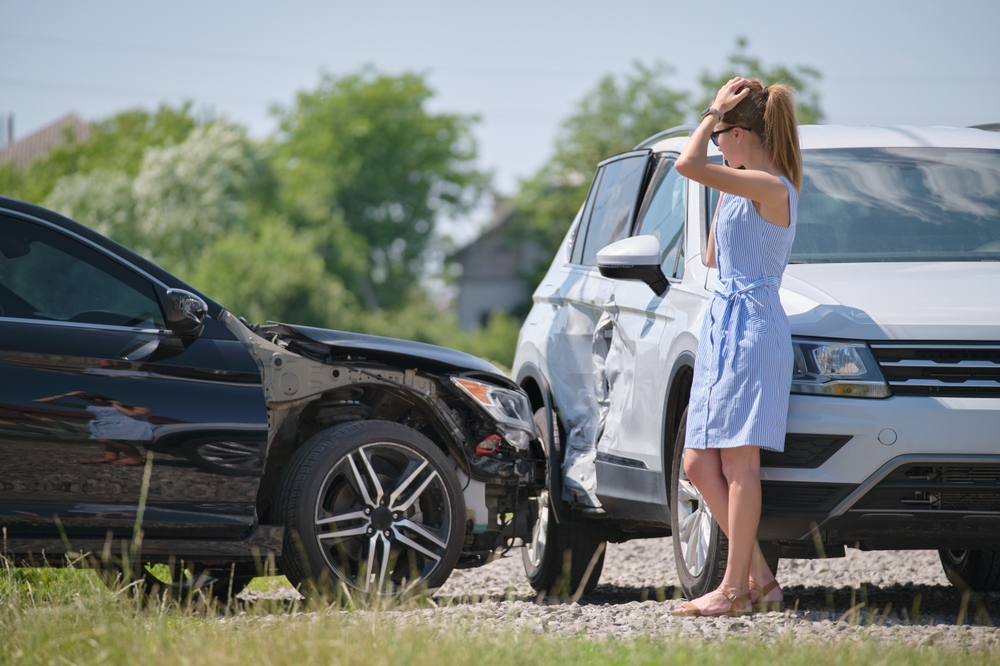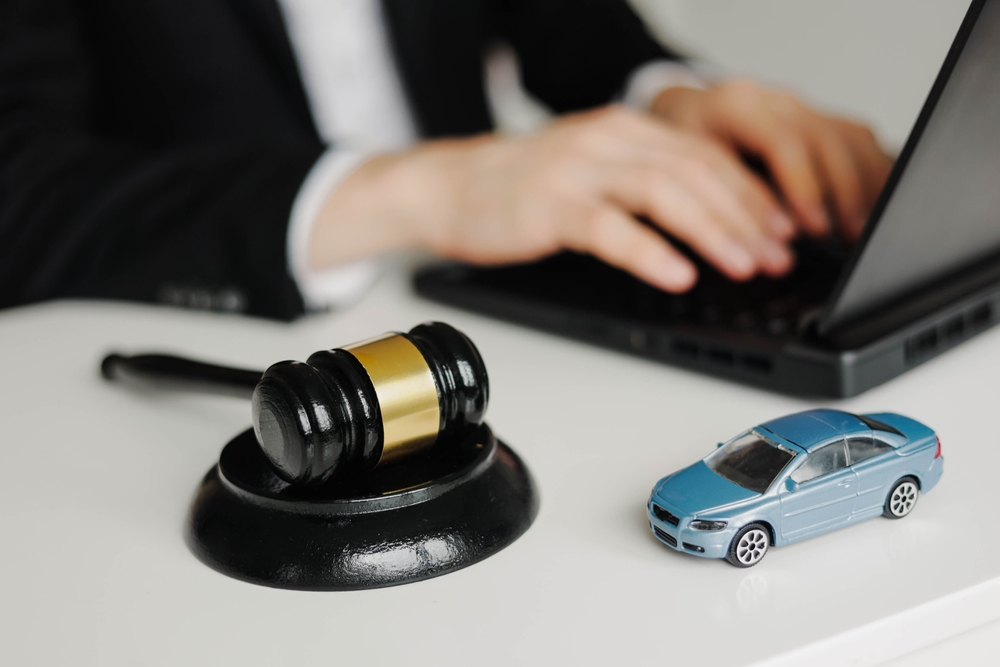Riddle & Riddle Injury Lawyers | September 11, 2024 | Car Accidents

While it is not always legally required, having a police report can be very important when filing a personal injury claim following a car crash. The police report serves as an official record, documenting key details including how the collision occurred, who was involved, and who may be at fault. This information can significantly strengthen your case when dealing with insurance companies or in court.
Without a police report, proving the circumstances of the accident and establishing liability becomes more challenging, which can affect your ability to recover compensation for your injuries. Therefore, while it is not mandatory, it is highly recommended to obtain a copy of the police report as soon as possible after your car crash.
A knowledgeable car accident attorney can gather police reports and other evidence to establish the legal elements of your claim or lawsuit. Your North Carolina car accident lawyer can also negotiate with insurance company representatives – or litigate your case in court – to maximize the compensation you receive for your injuries.
Types of Car Accidents That Result from Negligence

Car accidents resulting from driver negligence can take many forms, each with varying degrees of severity. Negligence often means failing to act with the care expected of a reasonable person. When drivers act negligently, they put themselves and others at risk, leading to different types of accidents.
One common type of accident resulting from negligence is rear-end collisions. These accidents happen when a driver fails to stop in time and crashes into the vehicle in front of them. Rear-end collisions often occur because the negligent driver is distracted, following too closely, or driving too fast for the road conditions.
Another type is the side-impact or T-bone collision. These accidents occur when a driver runs a red light, stop sign, or fails to yield at an intersection, causing them to crash into the side of another vehicle. T-bone accidents can be particularly dangerous, as the sides of vehicles generally offer less protection than the front or rear.
Head-on collisions are among the most severe types of accidents and often result from negligence, such as driving while intoxicated or distracted. In these accidents, two vehicles traveling in opposite directions crash into each other. The force of impact in head-on collisions is typically much greater, leading to serious injuries or fatalities.
Another result of negligence is a rollover accident, which can happen when a driver takes a turn too quickly, overcorrects their steering, or drives recklessly. Rollovers are especially common in SUVs and trucks due to their higher center of gravity. These accidents are extremely dangerous and can lead to severe injuries or death, especially if the occupants are not wearing seatbelts.
Finally, single-vehicle accidents often occur due to driver negligence. This type of accident happens when a vehicle runs off the road and crashes into a stationary object like a tree, pole, or barrier. Causes include distracted driving, speeding, or falling asleep at the wheel. In these types of accidents, injured passengers can file a personal injury claim with the driver’s insurance company.
Common Injuries in a Car Crash
When a car crash happens because of another driver’s negligence, the injuries people can suffer vary in severity and may affect different parts of the body.
- One of the most common injuries in a car crash is whiplash. Whiplash happens when the head and neck suddenly jolt forward and then backward, stretching the neck muscles and ligaments. Symptoms of whiplash include neck pain, stiffness, and headaches.
- Another frequent injury is a concussion, which is a type of traumatic brain injury (TBI). A concussion can occur if the victim’s head hits something hard, such as the steering wheel or window. Symptoms include headaches, dizziness, nausea, and sometimes problems with memory and concentration.
- Back injuries are also common in car collisions. The impact of a crash can cause damage to the spine, leading to herniated discs or fractures. People may experience severe back pain, numbness, or weakness in their legs as a result of the injury.
- Broken bones are another potential injury. The force of a collision can cause fractures in various parts of the body, such as the arms, legs, ankles, or wrists. These injuries often require medical treatment and can take weeks or months to heal.
- Internal injuries are also a concern. The force of the crash can cause damage to internal organs like the spleen, liver, or kidneys. Symptoms may include abdominal pain, swelling, or bruising. Internal injuries can be serious and may need immediate medical attention.
- Soft tissue injuries affecting muscles, tendons, and ligaments are also common. Sprains and strains in the arms, legs, or back can occur, causing pain and limited movement.
Finally, psychological injuries, such as post-traumatic stress disorder (PTSD) or anxiety, can result from the trauma of a car accident. People may experience flashbacks, nightmares, or constant worry about driving.
Each type of injury requires appropriate medical treatment and can have a lasting effect on a person’s life.
Types of Helpful Evidence in a Car Accident Claim or Lawsuit
Strong evidence is important in a car accident claim or lawsuit for establishing liability and proving damages. Different types of evidence can significantly affect the outcome of a case. Among the most helpful types are a copy of the police report, photographs of the accident scene, witness statements, medical records, and vehicle damage assessments.
A police report is one of the most important pieces of evidence in a car crash claim. Law enforcement officers who respond to the scene create this official document. It includes critical information such as the date and time of the accident, the location, the parties involved, and sometimes the officers’ opinions on fault. The police report can help establish a factual account of the accident and provide credibility to your claim.
Photographs of the accident scene are another key type of evidence. These images should capture the positions of the vehicles, damage to each vehicle, and any relevant road conditions or traffic signs. Photos taken from different angles can help recreate the scene and provide visual proof of the extent of damage and the overall circumstances of the accident.
Witness statements are also valuable. Eyewitnesses who saw the accident can provide testimonies that support your version of events. Their statements can corroborate your account and offer an impartial perspective on what happened.
Medical records play a critical role in proving the extent of injuries sustained in the accident. These records include detailed reports from healthcare providers, diagnostic tests, and treatment plans. They help demonstrate the physical effect of the accident and establish a connection between the collision and any injuries or ongoing medical issues.
Finally, vehicle damage assessments are useful in determining the severity of the collision and the cost of repairs. Professional appraisers or insurance adjusters who evaluate the damage to the vehicles involved usually conduct these assessments. The extent of damage can help establish the force of the impact and support claims for repairs or replacement.
Each type of evidence provides valuable information that can strengthen your case and ensure you receive fair compensation for your damages and injuries.
Settling or Litigating a Car Accident Case

Deciding whether to settle or litigate a car collision case can be a complex decision. Both options have advantages and drawbacks, and the right choice depends on your specific situation and goals. The following is a breakdown to help you decide.
Settling a Case
Settling a car crash case means agreeing to a financial compensation offer from the insurance company or the other party involved without going to court. Settlements can be appealing because they are usually faster and less stressful than a trial.
One major advantage of settling is that you can avoid the uncertainty of a court trial. Trials can be unpredictable, and there’s no guarantee of winning. Settlements provide a certain outcome and can often be completed more quickly, allowing you to receive your compensation sooner. In addition, settling usually costs less in legal fees and can avoid the lengthy process of preparing for a trial.
However, settling also means you may receive less money than you can potentially get from a trial. Once you accept a settlement, you generally cannot seek more money later, even if additional damages or issues arise.
Litigating a Case
Litigating a case means taking your claim to court and allowing a judge or jury to decide the outcome. This option can be beneficial if you believe the settlement offer is too low or if liability is disputed and needs to be clearly established.
Going to trial allows you to present evidence, such as witness testimony and expert opinions, to support your claim. A favorable court decision can potentially result in a higher compensation amount, covering all damages and losses.
However, litigation can be time-consuming and expensive. Trials often take months or even years to resolve, and legal fees can add up. Furthermore, the outcome of a trial is uncertain. Even if you win, you may not receive the amount you hoped for, and the process can be stressful and emotionally draining.
Making the Decision
To decide whether to settle or litigate, consider the following factors:
- The Strength of Your Case – Evaluate how strong your evidence and arguments are. If you have a strong case, litigation may be worth considering.
- The Settlement Offer – Compare the offer to your potential trial award. If the offer is fair and covers your damages, settling may be a better option.
- Time and Costs – Consider whether you are willing to invest time and money into a trial.
Assessing your case’s strength, the settlement offer and the time and costs involved can help you make an informed decision.
Recoverable Car Accident Damages
In a car collision claim or lawsuit, you can seek compensation for various damages. These damages are typically categorized into economic and non-economic damages, each covering different aspects of the losses you have experienced.
Economic Damages
Economic damages are tangible and can be easily calculated. They include:
- Medical Expenses – This type of damage covers the cost of treatment for injuries sustained in the accident, including hospital bills, doctor visits, surgeries, medications, and rehabilitation. You can also claim future medical expenses if you will need ongoing treatment.
- Lost income – If the car accident caused you to miss work, you can recover compensation for the total earnings you lost. This compensation includes income, salaries, and any potential bonuses or raises you may have missed.
- Property Damage – Property damage includes the cost of repairing or replacing your vehicle and any other personal property damaged in the accident, such as your clothing or electronics.
- Out-of-pocket Expenses – These expenses are additional costs related to the accident, such as transportation costs for medical appointments or hiring someone to help with daily tasks while you recover.
Non-Economic Damages
Non-economic damages are more subjective and harder to quantify but are equally important. They include:
- Pain and Suffering – This compensates you for the physical pain and emotional distress the accident and your injuries caused. It includes the discomfort, inconvenience, and reduced quality of life you experience.
- Emotional Distress – Emotional distress covers the psychological repercussions of the accident, such as anxiety, depression, or PTSD. It reflects how the accident has affected your mental health and overall well-being.
- Loss of Enjoyment of Life – If the accident has prevented you from participating in activities or hobbies you previously enjoyed, you may be entitled to compensation for this loss. This damage reflects how your lifestyle has been altered.
- Loss of Consortium – In cases where a spouse or family member is severely injured, the affected partner may claim compensation for the loss of companionship, support, and intimacy.
Each type of damage aims to compensate for different aspects of harm that the accident caused.
Speak with an Experienced Car Accident Lawyer Today
If you recently suffered injuries in a car crash, an experienced personal injury attorney can gather the evidence necessary to prove your case. Your personal injury lawyer can handle every step of the claims-filing or litigation processes for you in pursuit of the justice and compensation you deserve.
An experienced car accident attorney can help you obtain important evidence including the police report. They will fight to get you the compensation you deserve. Don’t delay, call today.
Contact a Personal Injury Lawyer from Riddle & Riddle Injury Lawyers for Help Today
For more information, please contact Riddle & Riddle Injury Lawyers to schedule a free consultation with a personal injury lawyer in North Carolina today. We have twelve convenient locations in North Carolina, including Greenville, Raleigh, Goldsboro, Jacksonville, Kinston, Charlotte, Greensboro, Durham, Fayetteville, Wilmington, Winston-Salem & Garner.
Riddle & Riddle Injury Lawyers – Raleigh Office
4600 Marriott Dr STE 500, Raleigh, NC 27612
(919) 876-3020
Riddle & Riddle Injury Lawyers – Durham Office
100 E Parrish St STE 200, Durham, NC 27701
(919) 728-1770
Riddle & Riddle Injury Lawyers – Goldsboro Office
601 N Spence Ave, Goldsboro, NC 27534
(919) 778-9700
Riddle & Riddle Injury Lawyers – Charlotte Office
1914 J N Pease Pl Suite 142, Charlotte, NC 28262
(704) 486-5824
Riddle & Riddle Injury Lawyers – Greenville Office
300 E Arlington Blvd Suite 2A #110, Greenville, NC 27858
(252) 397-8620
Riddle & Riddle Injury Lawyers – Fayetteville Office
2517 Raeford Rd, Fayetteville, NC 28305
(910) 387-9186
Riddle & Riddle Injury Lawyers – Greensboro Office
7B Corporate Center Ct Suite 15, Greensboro, NC 27408
(336) 516-9066
Riddle & Riddle Injury Lawyers – Jacksonville Office
3391 Henderson Dr, Jacksonville, NC 28546
(910) 455-5599
Riddle & Riddle Injury Lawyers – Garner Office
500 Benson Rd Suite 111, Garner, NC 27529
(800) 525-7111
Riddle & Riddle Injury Lawyers – Kinston Office
807 N Queen St, Kinston, NC 28501
(252) 397-8624
Riddle & Riddle Injury Lawyers – Wilmington Office
1608 Queen St Suite 12, Wilmington, NC 28401
(910) 889-4064
Riddle & Riddle Injury Lawyers – Winston-Salem Office
102 W 3rd St, Ste 1007, Winston-Salem, NC 27101
(336) 516-9042
